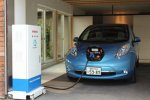Nissan has unveiled a system that enables electricity stored in the Nissan LEAF’s lithium-ion batteries to be used in the household; effectively acting as home battery backup system with enough storage to run the average Australian household for over a day.
Most home grid connect solar power systems don’t have a bank of batteries to store surplus electricity generated by their solar panels, but instead export that power to the mains grid. System owners either receive a cash payment or some form of credit for that surplus electricity under feed in tariff initiatives and other programs. During the night and in unfavourable conditions, electricity is drawn from the mains grid to supply the home.
During blackout conditions however, solar households are in exactly the same boat as their non-household neighbours. In a blackout, the inverter of a grid connect solar power system automatically shuts itself off within a few milliseconds to avoid a potentially dangerous “brown-out” and to prevent back feeding the grid, which can pose a safety issue for electricity company workers repairing the problem.
As we increasingly move towards electric cars for transportation, electric vehicles will play a bigger role in not just getting us from place to place, but also storing energy for domestic purposes during periods where mains electricity supply is interrupted.
The system developed for the Nissan LEAF enables the car to be connected to the house’s electricity distribution panel using a connector linked to the electric vehicle’s quick charging port. The Nissan LEAF’s lithium-ion batteries can store up to 24kWh of electricity, sufficient to power the average Australian home consuming 18 kWh of electricity daily for a full day, with some electricity to spare.
Nissan believes this system could also reduce the burden on the mains grid by charging and storing electricity in the Nissan LEAF during off-peak periods or through solar power, for use during high demand periods.
Nissan says current LEAF owners will be able to use the system once it’s made available. The company is currently continuing development and studying how it can be fully aligned and connected with current power systems.












































